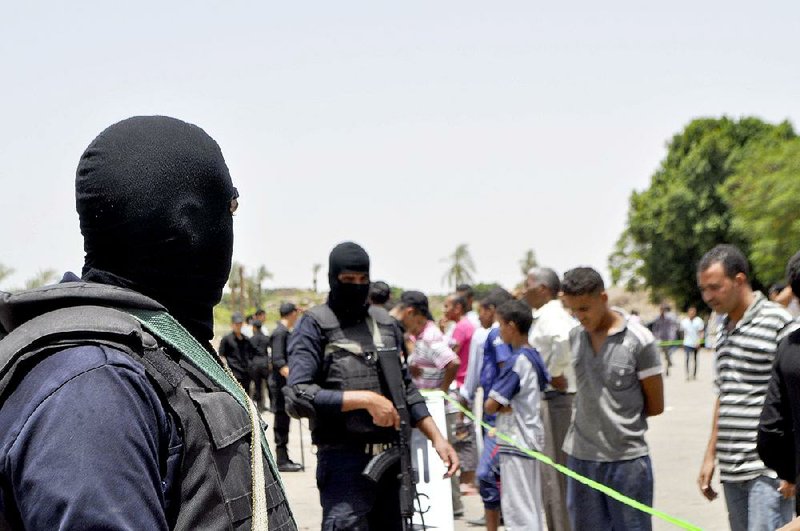LUXOR, Egypt -- A suicide bomber blew himself up Wednesday close to the ancient pharaonic temple of Karnak in southern Egypt, a site visited by millions every year, the government said. No tourists were hurt, and the Nile-side monument was not damaged.
The attack was the second this month near a major tourist attraction in Egypt. The tourism industry is only just beginning to recover from the turmoil in the country since 2011. On June 3, gunmen on a motorcycle opened fire outside the famed Giza pyramids on the outskirts of Cairo, killing two police officers.
In Wednesday's violence, officials said security at Karnak prevented the suicide bomber from entering the temple complex, and the forces battled two gunmen who were with him, killing one and capturing the other.
Karnak is one of Egypt's biggest tourist draws, a complex of temples, colossal statues, obelisks and columns built by a succession of pharaonic dynasties. The oldest sections date back nearly 4,000 years.
Mohammed Sayed Badr, the governor of Luxor province, said the attack was "an attempt to break into the temple of Karnak."
"They didn't make it in," he said.
Badr said the suspicions of police were raised when they saw three men carrying bags get out of a car in a parking lot. One began running when police ordered them to stop, so the police fired at him, and an explosive belt he was wearing blew up. The Tourism Ministry said in a statement that the man detonated his "explosive device," killing himself instantly.
A second man had a gun and opened fire at police before he was shot and killed. The third attacker was wounded in the shootout and arrested, Badr said.
The exchange of fire wounded four people, including two policemen and a staff member at the site, according to the Interior Ministry, which is in charge of police.
Badr said the nationalities of the attackers have yet to be determined.
There were only a handful of tourists and Egyptians inside the temple at the time of the attack, security officials said, speaking on condition of anonymity because they were not authorized to talk to the media.
Tourism Minister Khaled Ramy said he expects the industry's slow recovery to continue despite the attack. "Security forces were there. It's a very important message to everyone," he said on a flight from Cairo to Luxor.
After meeting with the interior minister and the prime minister, President Abdel-Fattah el-Sissi praised the police and called for increasing security at tourist sites.
Karnak temple director Mohammed Abdel-Aziz said the monument "is safe and unaffected, and visitors continue to arrive."
There was no immediate claim of responsibility, but it bore the hallmarks of Islamic militants who have been battling security forces in the strategic Sinai Peninsula.
Last year, the main Sinai-based insurgent group, Ansar Beit al-Maqdis, pledged allegiance to the Islamic State extremist group, which has destroyed famed archaeological sites in Syria and Iraq, viewing them as idolatrous.
The Sinai violence accelerated and spread after the 2013 military overthrow of Islamist President Mohammed Morsi. The militants said the attacks are in retaliation for a crackdown on Islamists in Egypt.
Late Tuesday, militants in North Sinai fired a series of rockets into an airport used by a group of international observers stationed at a nearby base under a provision of the 1979 peace agreement between Egypt and Israel. No one was harmed, but the attack ended two years of truce in which the militants spared the observer force from attack despite escalating battles with Egyptian government forces in the area around it.
A Twitter account believed to belong to the North Sinai unit of the Islamic State militant group claimed responsibility for the rocket attack.
Militants in Sinai have largely targeted police and soldiers. But the violence at Karnak and Giza raise the prospect that the extremists are turning to the tourism industry.
In the 1990s, Islamic insurgents battling the government intentionally targeted tourism in a bid to undermine the economy. The deadliest example of that was seen in Luxor in November 1997, when militants attacked tourists at the 3,400-year-old Hatshepsut Temple, killing 58.
Luxor is home to some of Egypt's most famous ancient temples and pharaonic tombs, including that of King Tutankhamen. The city has been one the sites hit hardest by the sharp downturn in foreign visitors since Egypt's 2011 uprising that ousted autocrat Hosni Mubarak.
Information for this article was contributed by Maggie Michael and Frank Jordans of The Associated Press and by David D. Kirkpatrick and Merna Thomas of The New York Times.
A Section on 06/11/2015

